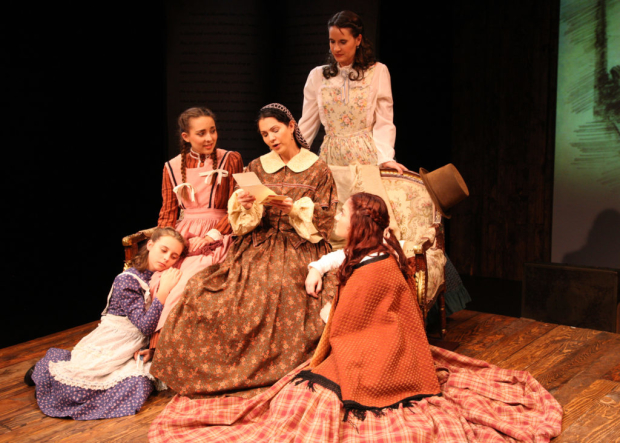Little Women
The Broadway musical version of Louisa May Alcott’s classic heralds the coming of the holiday season.

(© Chance Theater)
With only a piano and a small cast, Chance Theater's production of Little Women is a pleasurable surprise — a warm and inviting musical, filled with spirited characters and melodic songs. It feels like being home for the holidays with family.
Adapted from Louisa May Alcott's 19th-century novel, the show follows the four March daughters as they grow up and find independence and love in Civil War era New England. Jo (Ashley Arlene Nelson), the freethinker, writes gory pulp fiction, a quite unladylike pastime for a young woman of that era. Her older sister Meg (Laura M. Hathaway) is emerging as a viable candidate for marriage within society. Beth (Emma Nossal), the emotional center of the family, plays her piano and keeps the family strong. Amy (played by Alea Jordan as a child, and Angela Griswold as an adult) resents being the youngest and envies her sister Jo's life. She sabotages and belittles Jo mostly because she reveres her too much and doesn't think she has the opportunities afforded Jo. Watching over the girls is their loving mother Marmee (Rachel Oliveros Catalano) who raises them alone, while her husband has gone to war as a chaplain.
Nelson is endearing as Jo. She reflects the young writer's passion, her voice getting brassy when she gets excited. Unfortunately, she does strain to hit the high notes. Nossal is ethereal as the tragic but hopeful Beth. Hathaway and Jimmy Saiz steal the focus by both being so dynamic. Meg, often considered the forgotten character, is made to be the most fascinating thanks to Hathaway. It's clear that Hathaway is always listening and thinking. She doesn't create a phony reaction; she allows her instincts to guide her. Saiz, who plays Laurie, the March's honorary family member, has a Broadway-caliber voice and lights up the stage whenever he appears. Jordan and Griswold are both lovable as the immature, self-involved Amy.
The songs by Jason Howland and Mindi Dickstein are catchy, but none are especially memorable. The book, by Allan Knee, captures quite a bit of the book's plot but doesn't feel bogged down until the end. Once Jo resolves to turn her life into a novel, the story feels complete, yet there are two additional scenes that feel superfluous. Amy's marriage and Jo's final romance, both anticlimactic as written, feature sluggish songs. Director Casey Long treats the audience like invited guests at the March dinner table, staging the show with such delicacy that it feels cozy for a 150-seat theater.
The costumes by Erika C. Miller are not only appropriate for the period, but also well-tailored for each of the actors, and credible for their characters. Masako Tobaru's set looks like large blown-up pages of Alcott's book that compartmentalize the stage into sections. The space is framed with wood panels that mimic the look of the March home. The projections with etchings of living rooms and locations are charming and set a 19th-century atmosphere. While much of the action revolves around the piano granted to Beth, with several actors playing on this endearing gift, the piano is imagined. This makes for odd moments when the actors mime playing the piano in the air. Though it may have been too difficult to haul a baby grand onstage, even a mocked-up version would have been less awkward visually.
In the end, though, Little Women proves to be the perfect holiday vehicle, generating mirth and adoration for the whole family.











